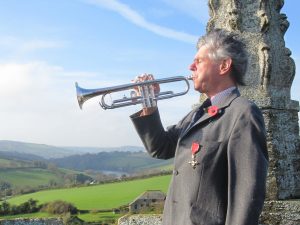Here are two apparently simple, but unrelated, questions: (i) if you see someone having a heart attack on a boat moored in the harbour, should you call an ambulance? and (ii) at what time should South Pool observe its annual two minute silence?
The answer to the first question is no, you should not call an ambulance. You should dial 999 and ask for the Coastguard. This is because the ambulance service’s co-ordination centre at Taunton cannot be expected to cope with boats. We don’t want the risk of a first responder standing on Whitestrand asking for directions to a house called Egremont. The Coastguard, by contrast, knows, and exercises regularly with, the harbour staff. They are well able to get ambulances, lifeboats and the like to the scene without the loss of valuable, critical minutes.
 The answer to the second question is also not quite as simple as at first appears. It has puzzled me for the last nine years since my lovely bride “volunteered” me to play the Last Post – the end of which signals the start of the two minute silence. The national two minute silence is meant to start at 11 o’clock precisely. But around the harbour there are other signals: Salcombe lets off a maroon to start (and finish) their two minute silence. Kingsbridge fires a gun. At 5 seconds for every mile (in still air), the signal from Salcombe takes 10 seconds to arrive in South Pool; the signal from Kingsbridge takes 17 seconds. So, if we start the silence in South Pool exactly at 11 o’clock, it is soon punctuated by what sounds like Salcombe and Kingsbridge exchanging fire – and the congregation thinks we have got the timing wrong (again!).
The answer to the second question is also not quite as simple as at first appears. It has puzzled me for the last nine years since my lovely bride “volunteered” me to play the Last Post – the end of which signals the start of the two minute silence. The national two minute silence is meant to start at 11 o’clock precisely. But around the harbour there are other signals: Salcombe lets off a maroon to start (and finish) their two minute silence. Kingsbridge fires a gun. At 5 seconds for every mile (in still air), the signal from Salcombe takes 10 seconds to arrive in South Pool; the signal from Kingsbridge takes 17 seconds. So, if we start the silence in South Pool exactly at 11 o’clock, it is soon punctuated by what sounds like Salcombe and Kingsbridge exchanging fire – and the congregation thinks we have got the timing wrong (again!).
The solution? To keep the Last Post going in South Pool until 11.00.15. After that we then get (or may get, it all depends on the wind) the Kingsbridge bang and can have real silence until the sound from Salcombe’s second maroon reaches South Pool at 11.02.10.
Finally, a quick note about lifejackets. Standard buoyancy aids (jackets with kapok or other filler) do not generally require servicing and just need to be tested from time to time. But gas-filling lifejackets – either with a pull-cord beloved of airline cabin crew, or the automatic kind which inflate when they hit the water – do need to be properly checked and serviced every few years. Now is a good time to get this done.
Comments are closed, but trackbacks and pingbacks are open.